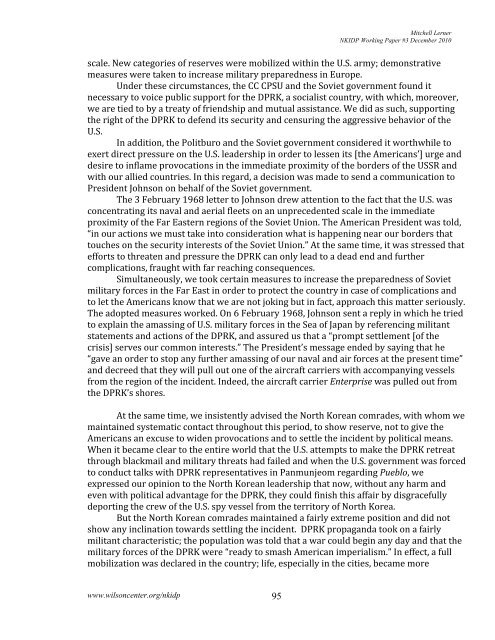"Mostly Propaganda in Nature:" Kim Il Sung, the Juche Ideology, and ...
"Mostly Propaganda in Nature:" Kim Il Sung, the Juche Ideology, and ...
"Mostly Propaganda in Nature:" Kim Il Sung, the Juche Ideology, and ...
Create successful ePaper yourself
Turn your PDF publications into a flip-book with our unique Google optimized e-Paper software.
Mitchell Lerner<br />
NKIDP Work<strong>in</strong>g Paper #3 December 2010<br />
scale. New categories of reserves were mobilized with<strong>in</strong> <strong>the</strong> U.S. army; demonstrative<br />
measures were taken to <strong>in</strong>crease military preparedness <strong>in</strong> Europe.<br />
Under <strong>the</strong>se circumstances, <strong>the</strong> CC CPSU <strong>and</strong> <strong>the</strong> Soviet government found it<br />
necessary to voice public support for <strong>the</strong> DPRK, a socialist country, with which, moreover,<br />
we are tied to by a treaty of friendship <strong>and</strong> mutual assistance. We did as such, support<strong>in</strong>g<br />
<strong>the</strong> right of <strong>the</strong> DPRK to defend its security <strong>and</strong> censur<strong>in</strong>g <strong>the</strong> aggressive behavior of <strong>the</strong><br />
U.S.<br />
In addition, <strong>the</strong> Politburo <strong>and</strong> <strong>the</strong> Soviet government considered it worthwhile to<br />
exert direct pressure on <strong>the</strong> U.S. leadership <strong>in</strong> order to lessen its [<strong>the</strong> Americans’] urge <strong>and</strong><br />
desire to <strong>in</strong>flame provocations <strong>in</strong> <strong>the</strong> immediate proximity of <strong>the</strong> borders of <strong>the</strong> USSR <strong>and</strong><br />
with ou r allied countries. In this regard, a decision was made to send a communication to<br />
President Johnson on behalf of <strong>the</strong> Soviet government.<br />
The 3 February 1968 letter to Johnson drew attention to <strong>the</strong> fact that <strong>the</strong> U.S. was<br />
concentrat<strong>in</strong>g its naval <strong>and</strong> aerial fleets on an unprecedented scale <strong>in</strong> <strong>the</strong> immediate<br />
proximity of <strong>the</strong> Far Eastern regions of <strong>the</strong> Soviet Union. The American President was told,<br />
“<strong>in</strong> our actions we must take <strong>in</strong>to consideration what is happen<strong>in</strong>g near our borders that<br />
touches on <strong>the</strong> security <strong>in</strong>terests of <strong>the</strong> Soviet Union.” At <strong>the</strong> same time, it was stressed that<br />
efforts to threaten <strong>and</strong> pressure <strong>the</strong> DPRK can only lead to a dead end <strong>and</strong> fur<strong>the</strong>r<br />
complications, fraught with far reach<strong>in</strong>g consequences.<br />
Simultaneously, we took certa<strong>in</strong> measures to <strong>in</strong>crease <strong>the</strong> preparedness of Soviet<br />
military forces <strong>in</strong> <strong>the</strong> Far East <strong>in</strong> order to protect <strong>the</strong> country <strong>in</strong> case of complications <strong>and</strong><br />
to let <strong>the</strong> Americans know that we are not jok<strong>in</strong>g but <strong>in</strong> fact, approach this matter seriously.<br />
The adopted measures worked. On 6 February 1968, Johnson sent a reply <strong>in</strong> which he tried<br />
to expla<strong>in</strong> <strong>the</strong> amass<strong>in</strong>g of U.S. military forces <strong>in</strong> <strong>the</strong> Sea of Japan by referenc<strong>in</strong>g militant<br />
statements <strong>and</strong> actions of <strong>the</strong> DPRK, <strong>and</strong> assured us that a “prompt settlement [of <strong>the</strong><br />
crisis] serves our common <strong>in</strong>terests.” The President’s message ended by say<strong>in</strong>g that he<br />
“gave an order to stop any fur<strong>the</strong>r amass<strong>in</strong>g of our naval <strong>and</strong> air forces at <strong>the</strong> present time”<br />
<strong>and</strong> decreed that <strong>the</strong>y will pull out one of <strong>the</strong> aircraft carriers with accompany<strong>in</strong>g vessels<br />
from <strong>the</strong> region of <strong>the</strong> <strong>in</strong>cident. Indeed, <strong>the</strong> aircraft carrier Enterprise was pulled out from<br />
<strong>the</strong> DPRK’s shores.<br />
At <strong>the</strong> same time, we <strong>in</strong>sistently advised <strong>the</strong> North Korean comrades, with whom we<br />
ma<strong>in</strong>ta<strong>in</strong>ed systematic contact throughout this period, to show reserve, not to give <strong>the</strong><br />
Americans an excuse to widen provocations <strong>and</strong> to settle <strong>the</strong> <strong>in</strong>cident by political means.<br />
When it became clear to <strong>the</strong> entire world that <strong>the</strong> U.S. attempts to make <strong>the</strong> DPRK retreat<br />
through blackmail <strong>and</strong> military threats had failed <strong>and</strong> when <strong>the</strong> U.S. government was forced<br />
to conduct talks with DPRK representatives <strong>in</strong> Panmunjeom regard<strong>in</strong>g Pueblo, we<br />
expressed our op<strong>in</strong>ion to <strong>the</strong> North Korean leadership that now, without any harm <strong>and</strong><br />
even with political advantage for <strong>the</strong> DPRK, <strong>the</strong>y could f<strong>in</strong>ish this affair by disgracefully<br />
deport<strong>in</strong>g <strong>the</strong> crew of <strong>the</strong> U.S. spy vessel from <strong>the</strong> territory of North Korea.<br />
But <strong>the</strong> North Korean comrades ma<strong>in</strong>ta<strong>in</strong>ed a fairly extreme position <strong>and</strong> did not<br />
show any <strong>in</strong>cl<strong>in</strong>ation towards settl<strong>in</strong>g <strong>the</strong> <strong>in</strong>cident. DPRK propag<strong>and</strong>a took on a fairly<br />
militant characteristic; <strong>the</strong> population was told that a war could beg<strong>in</strong> any day <strong>and</strong> that <strong>the</strong><br />
military forces of <strong>the</strong> DPRK were “ready to smash American imperialism.” In effect, a full<br />
mobilization was declared <strong>in</strong> <strong>the</strong> country; life, especially <strong>in</strong> <strong>the</strong> cities, became more<br />
www.wilsoncenter.org/nkidp<br />
95

















